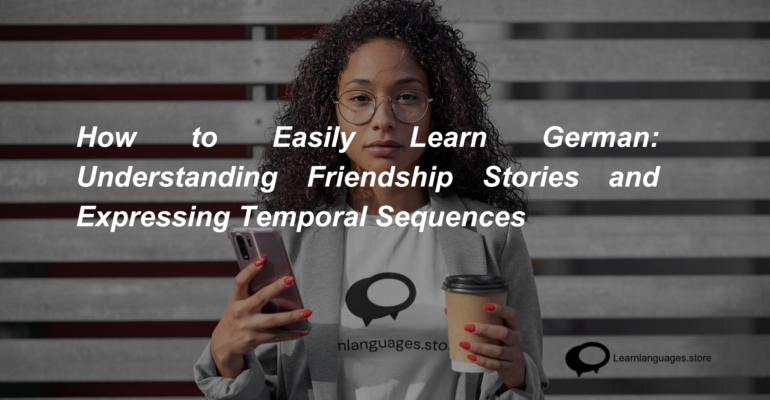How to Easily Learn German: Understanding Friendship Stories and Expressing Temporal Sequences
How to Easily Learn German: Understanding Friendship Stories and Expressing Temporal Sequences
Estimated reading time: 9 minutes
Introduction:
Learning German can be an exciting journey, especially when you can relate it to everyday topics like friendships, relationships, and conflicts. In this blog, we will explore how to express sequences of events, talk about friendships, discuss conflicts, and much more, using real-life examples. We’ll also dive into some essential German grammar points at the B1 level, like the Plusquamperfekt and Temporale Nebensätze. Additionally, you’ll find a vocabulary table with examples and Hindi pronunciation guides to make your learning experience even more seamless.

1. Understanding Friendship Stories (Freundschaftsgeschichten verstehen)
Friendship is a universal theme that resonates with everyone. In German, understanding and telling stories about friendships (Freundschaftsgeschichten) is an excellent way to practice your language skills. These stories often include a variety of tenses, vocabulary related to relationships, and expressions of emotions.
Example:
- German: Meine beste Freundin und ich haben uns in der Schule kennengelernt. Wir haben immer zusammen gelacht und sind oft nach der Schule spazieren gegangen.
- English: My best friend and I met in school. We always laughed together and often went for walks after school.
- Hindi Pronunciation: माईने बेस्टे फ्राइंडिन उंड इश हाबेन उनस इन डेर शूले केननगेलर्न्ट। वीर हाबेन इमर जुसामन गेलाच्त उंड सिंड ओफ्ट नाख डेर शूले श्पात्सीरेन गेगांगन।
2. Expressing Temporal Sequences (Zeitliche Abfolgen ausdrücken)
Understanding how to express temporal sequences is crucial in German. It allows you to communicate the order of events clearly and correctly.
Plusquamperfekt: Expressing Past Events
The Plusquamperfekt is used to describe an action that happened before another action in the past. It’s like saying “had done” something in English.
Example:
- German: Nachdem er gegessen hatte, ging er spazieren.
- English: After he had eaten, he went for a walk.
- Hindi Pronunciation: नाख़डेम एर गेगेसेन हाटे, गिंग एर श्पात्सीरेन।
Grammar Note:
To form the Plusquamperfekt, you use the Präteritum (simple past) of the auxiliary verbs “haben” or “sein” and the Partizip II (past participle) of the main verb.
- haben: Ich hatte gespielt (I had played).
- sein: Sie war gegangen (She had gone).
In the sentence “Nachdem er gegessen hatte, ging er spazieren,” the verb “essen” (to eat) is in the Plusquamperfekt (“gegessen hatte”) to indicate that eating happened before going for a walk.
Temporale Nebensätze: Expressing Time Relations
Temporale Nebensätze (temporal subordinate clauses) help you express relationships in time, such as actions that occur before, after, or while another action is happening. Some common conjunctions include:
- bevor (before)
- bis (until)
- nachdem (after)
- seit/seitdem (since)
- während (while)
Examples:
- German: Ich warte, bis er kommt.
- English: I wait until he comes.
- Hindi Pronunciation: इश वार्टे, बिस एर कोम्ट।
- German: Bevor ich ins Bett gehe, lese ich ein Buch.
- English: Before I go to bed, I read a book.
- Hindi Pronunciation: बिफ़ोर इश इन्स बेट गेहे, लेसे इश अइन बुख।
- German: Seitdem er nach Deutschland gezogen ist, hat er viel Deutsch gelernt.
- English: Since he moved to Germany, he has learned a lot of German.
- Hindi Pronunciation: साइट्डेम एर नाख़ डॉइच्लांड गेट्सोगेन इश, हाट एर फिल डॉइच गेलेरंट।
Grammar Note:
In German, the verb in the subordinate clause (Nebensatz) is placed at the end of the sentence. Understanding this structure is essential for forming complex sentences in German.
-
Product on sale
 German B1
German B1₹32,600.00
₹42,600.00 -
Product on sale
 German A2
German A2₹24,300.00
₹32,600.00
3. Talking About Friendships (Von Freundschaften erzählen)
Discussing friendships in German involves using specific vocabulary and understanding how to describe relationships and emotions.
Example:
- German: Ich habe eine sehr enge Freundschaft mit meinem Nachbarn. Wir teilen alles miteinander.
- English: I have a very close friendship with my neighbor. We share everything with each other.
- Hindi Pronunciation: इश हाबे आइन ज़ेयर एंगे फ्रॉयंडशाफ्ट मिट माइनम नाख़बार्न। वीर टाइलन अल्लेस मिटईनांडर।
Vocabulary Table:
| German Word | Meaning | Example Sentence | Hindi Pronunciation |
|---|---|---|---|
| Beziehungen | Relationships | Beziehungen zwischen Menschen sind wichtig. | बेज़ीहूंगेन त्सविष्चेन मेंशेन ज़िंड विछटिग। |
| Freundschaft | Friendship | Unsere Freundschaft ist stark. | उनज़रे फ्रॉयंडशाफ्ट इश्ट श्टार्क। |
| Konflikte | Conflicts | Konflikte lassen sich durch Gespräche lösen. | कॉन्फ़्लिक्टे लास्सन ज़िष दुर्ह गेश्प्रेछे लोज़न। |
4. Discussing Conflicts (Über Konflikte sprechen)
Conflicts are a part of any relationship, and knowing how to talk about them in German is important.
Example:
- German: Wir hatten einen Konflikt über die Hausarbeit, aber am Ende haben wir eine Lösung gefunden.
- English: We had a conflict about the housework, but in the end, we found a solution.
- Hindi Pronunciation: वीर हाटेन आइनेन कॉन्फ़्लिक्ट ऊबर दी हाउसअर्बाइट, अबेर अम एन्डे हाबेन वीर आइने लोज़ुंग गफुंडेन।
5. Handling Conflict Conversations (Konfliktgespräche führen)
When conflicts arise, being able to have a conversation about them is essential.
Example:
- German: Es ist wichtig, Konfliktgespräche ruhig und sachlich zu führen.
- English: It is important to conduct conflict conversations calmly and objectively.
- Hindi Pronunciation: एश इश्ट विछटिग, कॉन्फ़्लिक्ट्गेश्प्रेछे रूहीख उंड ज़ाख़लिष ज़ू फुहरन।
6. Assigning Information to Short Texts (Kurzen Texten Informationen zuordnen)
Reading comprehension is a key part of language learning. Practicing with short texts can help you improve your ability to extract and assign information correctly.
Example Exercise:
- German: Lesen Sie den folgenden Text und ordnen Sie die Informationen den richtigen Abschnitten zu.
- English: Read the following text and assign the information to the correct sections.
- Hindi Pronunciation: लेज़न ज़ी डेन फोलगेन्देन टेक्स्ट उंड ऑर्डनन ज़ी दी इंफॉर्माटियोनन डेन रिक्टिगेन अब्शनिटन ज़ू।
7. Introducing a Couple (Ein Paar vorstellen)
Introducing people, such as a couple, involves using descriptive language and understanding how to convey relationships in German.
Example:
- German: Das ist Anna und ihr Mann Peter. Sie sind seit fünf Jahren verheiratet.
- English: This is Anna and her husband Peter. They have been married for five years.
- Hindi Pronunciation: दास इश्ट अन्ना उंड ईर मान पीटर। ज़ी ज़िंड साइट फिन्फ़ यारेन फेरहाइरतेट।
8. Discussing Fables (Über Fabeln sprechen)
Fables are short stories that often teach a moral lesson. Discussing them in German can enrich your vocabulary and comprehension skills.
Example:
- German: In dieser Fabel geht es um einen schlauen Fuchs, der einen Wolf überlistet.
- English: This fable is about a clever fox who outsmarts a wolf.
- Hindi Pronunciation: इन डीज़र फाबल गेहत एश उम्ब आइनेन शलाऊन फुक्स, डेर आइनेन वोल्फ ऊबरलिस्टेट।
9. Reading a Text Aloud (Einen Text lebendig vorlesen)
Reading aloud is a great way to practice pronunciation, rhythm, and intonation in German.
Example:
- German: Lesen Sie den Text laut vor und achten Sie auf die Betonung der Wörter.
- English: Read the text aloud and pay attention to the emphasis on the words.
- Hindi Pronunciation: लेज़न ज़ी डेन टेक्स्ट लाउट फ़ोर उंड अख़्टन ज़ी औफ़ दी बेतोनुंग डेर वेरटेर।
10. Cultural Note: Famous Couples and Living Together in Germany
Berühmte Paare (Famous Couples): Germany has its share of famous historical couples, like Goethe and Christiane Vulpius, or more modern pairs like Steffi Graf and Andre Agassi. These couples often highlight aspects of German culture, such as a love for literature or sports.
Fun Fact: WG (Wohngemeinschaft): Living in a WG (shared apartment) is very common in Germany, especially among students and young professionals. It’s an economical and social way to live, where people share not only the rent but often friendships and daily experiences. In fact, even people over 50 are increasingly choosing to live in WGs to combat loneliness and share living costs.
11. Grammar Summary: Plusquamperfekt and Temporale Nebensätze
- Plusquamperfekt: Used for actions that happened before another past action.
- Formation: Auxiliary verb (haben/sein in Präteritum) + Partizip II
- Example: Nachdem er gegangen war, kam er zurück. (After he had gone, he came back.)
- Hindi Pronunciation: नाख़डेम एर गेगंगेन वार, काम एर त्सुरुक।
- Temporale Nebensätze: Used to express time relationships between actions.
- Conjunctions: bevor, bis, nachdem, seit/seitdem, während
- Example: Während ich kochte, klingelte das Telefon. (While I was cooking, the phone rang.)
- Hindi Pronunciation: वैहरेंड इश कोखटे, क्लिंगेलेट दास टेलेफोन।
12. Vocabulary Table for B1 German Level
| German Word | Meaning | Example Sentence | Hindi Pronunciation |
|---|---|---|---|
| Beziehungen | Relationships | Beziehungen sind komplex. | बेज़ीहूंगेन ज़िंड कॉम्प्लेक्स। |
| Freundschaft | Friendship | Eine gute Freundschaft ist wertvoll. | आइन गुटे फ्रॉयंडशाफ्ट इश्ट वेरट्फ़ोल। |
| Konflikte | Conflicts | Manchmal führen Konflikte zu besseren Lösungen. | मान्छ्मल फुह्रेन कॉन्फ़्लिक्टे त्सू बेसेरन लोज़ुंगन। |
Enhance Your German Skills!
To improve your German further, consider enrolling in our A1 Level German Course at Learn Languages Store for just Rs. 16,300. Our courses are designed to help you build a strong foundation in the German language in a fun and engaging way.
Contact Us to Learn More!
For more information about our courses, feel free to reach out to us at:
Address:
330, 3rd Floor, Big Splash (Near Vashi Bus Depot),
Sector 17, Vashi,
Navi Mumbai, Maharashtra 400703
Phone: +91-9594113111
Email: services@learnlanguages.store
Don’t miss the opportunity to enhance your language skills! Sign up today and start your journey to fluency in German!
Conclusion:
Learning German, especially at the B1 level, becomes easier when you relate it to everyday experiences like friendships, relationships, and conflicts. By understanding key grammar points like the Plusquamperfekt and Temporale Nebensätze, and practicing with relevant vocabulary, you can express yourself more clearly and confidently. Remember, practice makes perfect, so keep reading, speaking, and writing in German regularly!










